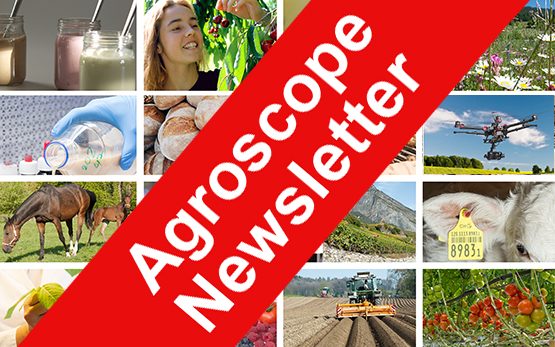United in the Fight against Japanese Beetle
Zurich-Reckenholz, 12.03.2020 - Agroscope has been awarded the contract for an EU Horizon2020 Project. Together with European partners, it aims to develop sustainable strategies for controlling the quarantine pest, Japanese beetle.
Sustainable plant protection is at the very top of Agroscope’s agenda. In keeping with this, Agroscope has been awarded the contract for an EU project whose aim is to control Japanese beetle sustainably. This success is consonant with the European Memorandum of Understanding for the Promotion of a Sustainable Agri-Food System, which Agroscope signed in February 2020.
Japanese beetle threatens a wide range of crops
Japanese beetle was first detected on Switzerland’s southern border in 2017, and it threatens to spread further into Switzerland and Europe. Both the adult beetles and the grubs endanger the European agricultural sector. As grubs, they feed on the roots of grass species for preference, and inflict damage on meadows and pastures in the same way as native grubs are known to do. The adult beetles have an exceptionally wide host range encompassing over 300 plant species – among them, important crop plants such as grapevines, berries and stone fruit, as well as maize and soybeans.
Cockchafer Strategy Used against Japanese Beetle
Initial laboratory trials have shown that entomopathogenic fungi from Agroscope’s Strain Collection can also infect the Japanese beetle. Such fungi have been successfully used for years to control the native relatives of the Japanese beetle, notably the cockchafer. A similar strategy is now to be developed to control the introduced Japanese beetle.
EUR 5.5 M for Four Years
Giselher Grabenweger, a researcher in the ‘Ecological Plant Protection in Field Crops’ Group, has been awarded the contract for an EU Horizon2020 project which he will lead as coordinator. Entitled ‘Integrated Pest Management of the invasive Japanese Beetle, Popillia japonica – IPM-Popillia’, the project is endowed with 5.5 million euros, and will run for four years.
13 European Institutions Involved
Several Agroscope research groups as well as 12 institutions from Germany, France, Italy, Austria, Portugal and Switzerland are collaborating in the project, which is led by Agroscope. Universities and research institutes are represented in the consortium, as well as SMEs from the biocontrol and IT sectors, official plant-protection services and agricultural cooperatives. This multidisciplinary approach is meant to ensure the ability of scientific findings to be implemented quickly in practice, since one thing counts above all others in stemming the current Japanese beetle invasion – speed!
Address for enquiries
Giselher Grabenweger
Coordinator of the IPM-Popillia Project
Agroscope
Reckenholzstrasse 191
8046 Zürich
Press Service Agroscope
media@agroscope.admin.ch
+41 58 466 88 62
Links
- Università degli studi di Siena, IT
- E-nema Gesellschaft für Biotechnologie und Biologischen Pflanzenschutz mbH, DE
- Pessl Instruments GmbH, AT
- SPOTTERON GmbH, AT
- Vignaioli Piemontesi S.C.A., IT
- Institut national de recherche pour l’agriculture, l’alimentation et l’environnement, FR
- Consiglio per la ricerca in agricoltura e l’analisi dell’economia agraria, IT
- Technische Universität München, DE
- Dipartimento dell'economia, Sezione dell'agricoltura, Servizio fitosanitario Ticino, CH
- Regione Piemonte, Settore Fitosanitario e servizi tecnico-scientifici, IT
- Fundação Gaspar Frutuoso, PT
- Jardin Suisse Ticino, CH
- Unveiling of the special stamp with Japanese beetle motif
- SZOW article on Japanese beetle
- Information on Japanese beetle at Agroscope
- Information on the use of entomopathogenic fungi to control cockchafer grubs
- Towards Pesticide-Free Agriculture (Memorandum of Understanding)
Publisher
AGROSCOPE
http://www.agroscope.admin.ch






